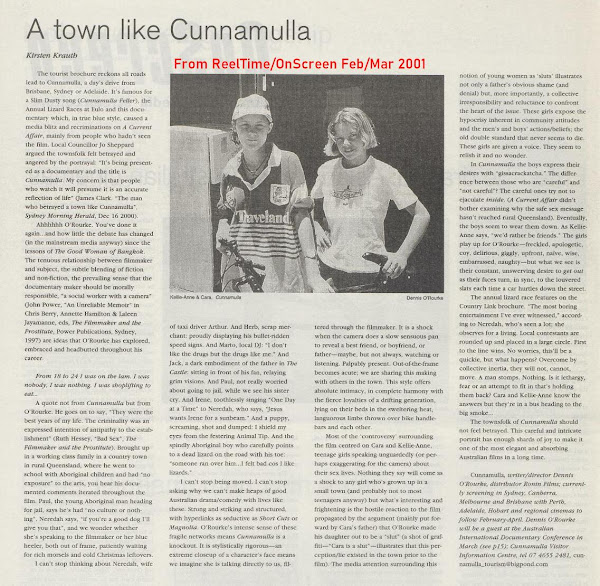Dennis O'Rourke was no stranger to controversy. "The Good Woman of Bangkok", his 1991 documentary about his relationship with a Thai bar girl, is almost certainly the most written about Australian documentary of recent years.
It created a furore amongst feminists when it was released at the Documentary conference in 1991. "Half Life" (1985) documented the official government cynicism behind US nuclear testing in the Pacific and led to open debate on the morality of exposing the Marshall Islanders to fallout.
His film "Cunnamulla" (1999) opened a lively debate both within and about the town that bears its name. The debate centred on O'Rourke's depiction of the sexual activities of a 13-year-old and 15-year-old girl in the town, namely Cara and Kellie-Ann respectively.
O'Rourke was attacked both in print and in person for his use of the girls' confessions on their real or imagined sexual adventures. Inter alia O'Rourke’s film exposes a type of Australian life on the fringe, and the attitudes of people living in that environment. As "Cunnamulla" eloquently states – the town is symbolically and actually at the end of the railway line, the permanent link to a wider community.
Every one will read "Cunnamulla" in their own way. For white middle-class viewers, the film is confronting and disturbing for its depiction of rural society, in much the same way that "Good Woman of Bangkok" was confronting in terms of sexual politics. Both films raise issues for which there are no simple solutions.
P.S. Dennis O'Rourke passed away in 2013, aged 67. If you are interested in his filmography, look for:
Yumi Yet – Independence for Papua New Guinea (1976)
Ileksen – Politics in Papua New Guinea (1978)
Yap… How Did You Know We’d Like TV? (1980)
The Shark Callers of Kontu (1982)
Couldn’t Be Fairer (1984)
Half Life – A Parable for the Nuclear Age (1985)
"Cannibal Tours" (1988)
The Good Woman of Bangkok (1991)
The Pagode da Tia Beth (1993)
Land Mines - A Love Story (2004)
To order any of these films, go to CAMERAWORK

